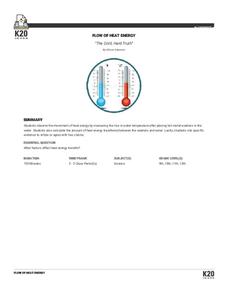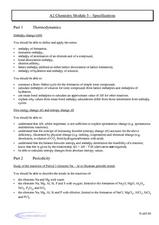K20 LEARN
The Cold, Hard Truth
Things are really getting heated in the lab! Science scholars scope out the facts about heat energy transfer using a simple lab from the K20 Center. Groups collaborate to observe temperature changes between hot metal and water, then use...
Beyond Benign
Enthalpy of Combustion
Learn the facts about types of wax! Partnered pupils determine the enthalpy of combustion for traditional paraffin candles, as well as soy-based candles. The activity focuses on calculations and compares the environmental impact of both...
Chemistry Collective
Virtual Lab: ATP Reaction (Thermochemistry and Bonding)
If you've ever felt a little drained ... try converting some ATP to ADP! Science scholars perform one of life's most important reactions using a simulated lab workbench. The fun-to-use interactive allows pupils to control the reactants...
Chemistry Collective
Virtual Lab: Camping Problem II
What happens to the enthalpy of a reaction as the concentration of reactants varies? Learners explore this question with a virtual lab activity. They consider five different solutions of the same reactants and monitor the temperature...
Royal Society of Chemistry
Symbols
Chemistry calculations can look a bit like alphabet soup at times. How do you help pupils make sense of it all? An interactive resource helps scholars sort through the symbols for common quantities such as moles, boiling point, and...
Royal Society of Chemistry
Born-Haber Cycle: NaCl
Max Born and Fritz Haber developed the Born-Haber cycle in 1916, which is used for measuring enthalpy that otherwise couldn't be measured. Young scientists solve four matching puzzles using their knowledge of the stages, standard...
American Chemical Society
Exothermic, Endothermic, and Chemical Change
Scientists can't observe bonds breaking or forming, so how do they distinguish between exothermic and endothermic reactions? Young scholars complete two experiments to do just that. They monitor temperature change and calculate the...
National Institute of Open Schooling
Chemical Thermodynamics
All chemical reactions require energy. To explore thermodynamics, classes read and discuss its laws, exothermic and endothermic reactions, enthalpy in many forms, calculate enthalpy problems, and use Hess' Law to calculate enthalpy of a...
Net Texts
Hess's Law Worksheet
Challenge young scholars' understanding of thermochemistry with this skills-practice learning exercise on Hess's Law. Given a series of five multi-step chemical reactions, students must determine the overall change in entropy for each.
Curated OER
Chemistry Module 5 - Specifications
While this resource does not provide problems for chemistry learners to solve, it outlines skills that they should have and concepts that they should grasp. Topics include thermodynamics, periodicity, redox equilibria, transition metals,...
Curated OER
Chemistry Module 2 - Specifications
A valuable resource provides a list of concepts that young chemists should grasp. The topics include energetics, kinetics, equilibria, redox reactions, and the halogen group. Employ this as a guide for your own curriculum planning, or a...
Curated OER
Thermometric Titration of an Unknown Acid
Students determine the number of ionizable hydrogen's in an unknown acid and determine the equivalent weight of an unknown acid. They determine the enthalpy change for the ionization of an unknown acid.
Clackamas Community College
Clackamas Community College: Heat of Solution
Simple description and demonstration to illustrate the concept of Heat of solution!














